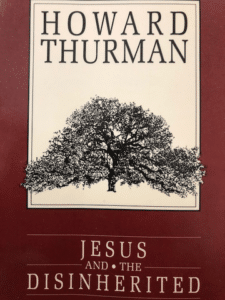Book Review:
Jesus and the Disinherited by Howard Thurman
Molly Lannon Kenny (’19)
It cannot be denied that too often the weight of the Christian movement has been on the side of the strong and the powerful and against the weak and oppressed—this, despite the gospel. —Howard Thurman

Once we had all “come clean,” so to speak, we each shared how the Living School program, in its own organic way, was shaping us, affording us new insights and opportunities, and deepening our spiritual life in ways that were deeply intimate and individual. We acknowledged the mystery of this journey and how it was unfolding for each one of us in exactly the ways we needed most in the moment.
For me, one of those moments of inspiration came in finding Howard Thurman’s short book, Jesus and the Disinherited, a seminal treatise on Jesus as a radical social change maker—positioned divinely on the margins to encourage and uplift the most marginalized and oppressed among us.
Living in a climate of deep insecurity, Jesus, faced with so narrow a margin of civil guarantees, had to find some other basis upon which to establish a sense of well-being. He knew that the goals of religion as he understood them could never be worked out within the then-established order. Deep from within that order he projected a dream, the logic of which would give to all the needful security. There would be room for all, and no man would be a threat to his brother. —Howard Thurman
Although I grew up enjoying several axes of privilege shared by many in my Living School cohort, including being white, upper middle class, educated, cisgendered, and heterosexual, I was always taught by my very Catholic parents to understand our religion in terms of its emphasis on radical inclusion. We were taught that to be Catholic meant caring for the under-privileged and under-served, and sharing whatever wealth or good fortune we might have stumbled upon in our own lives with those most in need.

By the time I had joined the Living School, I was deeply immersed in faith as a foundation for social justice work, but I was still searching for the words, the articulated ideas, that would form the ground for this work. In particular, I longed to learn and share ways in which we might—in our shared humanity—stay connected to one another when trust has been broken, when nerves are frayed, and when our communities become fractured through misunderstanding and conflicting methods and ideologies, even when those very ideologies were meant to serve the same end goal of social reformation and revolution.
It was pure happenstance that Father Richard mentioned Howard Thurman in passing during our January intensive. Something in me lit up and I ordered the book to be delivered to the Bosque Center during my stay. I dove in right away and have not come up since; I have been in a wonderful Howard Thurman rabbit hole for months.
Jesus and the Disinherited, although first published in 1949 and clearly intended to speak both to and on behalf of an historically Black audience, is filled with wisdom and insight that is every bit as relevant today as it was over half a century ago and every bit as practical for contemplatives and social justice activists of any race or religion.
The fundamental narrative of Jesus and the Disinherited is one in which Thurman proposes a re-examination and reclamation of the teachings of Jesus as solace and strength for the oppressed and disenfranchised. He turns on its head the image of Jesus and of the Christian church which subscribes to a narrative of domination, punishment, and hierarchy—one which offers little solace to an oppressed people and one that in fact oppresses us all in its suppression of a loving, radical, and fearless Jesus.
The basic fact is that Christianity as it was born in the mind of this Jewish teacher and thinker appears as a technique of survival for the oppressed. That it became, through the intervening years, a religion of the powerful and the dominant, used sometimes as an instrument of oppression, must not tempt us into believing that it was thus in the mind and life of Jesus. “In him was life; and the life was the light of men.” Wherever his spirit appears, the oppressed gather fresh courage; for he announced the good news that fear, hypocrisy, and hatred, the three hounds of hell that track the trail of the disinherited, need have no dominion over them. —Howard Thurman
Reading Jesus and the Disinherited was very much for me like the first time I read the Bhagavad Gita. Rather than understanding it as a philosophical or religious treatise, I felt it immediately as a guide to a life well lived. In the case of Howard Thurman’s book, this recipe is more collective than individual. It is a profound call to action for Christians and all people who are interested in a faith-based social justice. I would argue that there can be no other kind. It especially pushes those of us who do live with so much privilege to use our faith and our privileged position—one that Jesus did not share—to “center down” in Thurman’s own words and to ask ourselves how our faith is truly guiding and inspiring the deep work of social justice, of anti-racism, and of self-inquiry.
I recently led a retreat on integrating Christian and Vedantic philosophy and teachings in order to increase and enrich our faith life. I had an epiphany that I shared with my students, most of whom did not identify as Christian. Many, including myself, who were raised in a Christian faith based on domination and exclusion, left the church and any positive affiliation with Jesus. In fact, I would say in my own case that the secular often led to the cynical, and rather than having even a neutral relationship with Jesus, the invocation of his name or references to “being Christian” brought up suspicion and even derision. Howard Thurman gave me a profound gift in my own reclamation of relationship with Jesus. I came to realize that when we push Jesus away with such rancor, we are in fact reifying the vision of a dominating and petty Jesus. We are losing our loving Jesus by allowing him to be reduced to the image perpetuated by systems of oppression both within and outside of the church. To read and understand Jesus and the Disinherited is to be invited back to a renewed image of Jesus and the joyful and just human community he envisioned.

